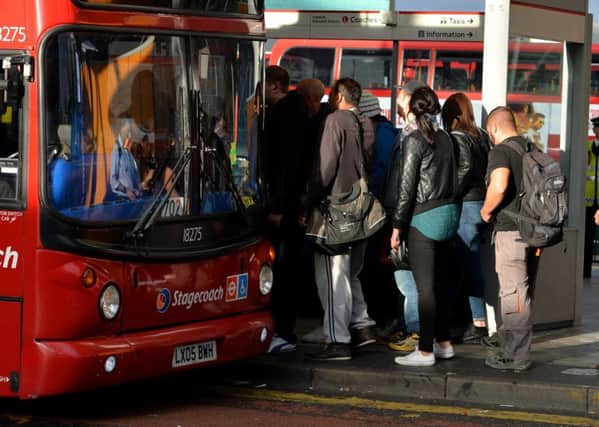Martin Abrams: Without urgent action the future for buses is bleak


Sadly, after swingeing Government funding cuts over recent years, we are seeing local authorities all over the country withdrawing support for essential bus services.
Today, more and more villages and towns are becoming public transport deserts, with little or no provision at all.
Advertisement
Hide AdAdvertisement
Hide AdThis is a crisis that can no longer be ignored by Whitehall. Losing public services is devastating enough for people, but losing your lifeline access to the vital services that remain can be the final straw for many.
Every day buses connect millions of people up and down the country to jobs, schools and shops and have an important role in ensuring people in rural areas, who might have no other means of transport, are not left isolated.
For many areas buses act as the glue holding the social fabric of that community together, connecting friends and family. Without them, people can become prisoners in their own communities.
Our latest Buses in Crisis report has shown that over £78m has been cut from local authority-supported funding in England and Wales since 2010.
Advertisement
Hide AdAdvertisement
Hide AdA 25 per cent reduction overall has resulted in over 2,400 bus services being reduced, altered or withdrawn completely.
In the last year alone, 63 per cent of local authorities in England and Wales have cut funding for buses, while 44 per cent have reduced or withdrawn services.
Local authority funding for supported bus services has fallen by £22.6m, the worst year for cuts to buses since 2010.
In the last year alone, we have seen 19 services reduced, altered or withdrawn across Yorkshire and Humber. People living in North Yorkshire will be some of the worst affected by these cuts as North Yorkshire County Council is proposing to cut £500,000 from its budget for supported bus services for the next financial year.
Advertisement
Hide AdAdvertisement
Hide AdSince the Government’s Spending Review in November, which set out its funding strategy for the next two years and confirmed reductions to transport spending and the local authority grant, it is clear there has been a definite spike in councils proposing even more cuts to buses.
Currently, 11 councils are proposing further cuts including North Yorkshire, Lancashire, Lincolnshire, Wiltshire, Somerset and Dorset.
Most embarrassing for the Government, however, is that both the Prime Minister’s and Transport Secretary’s local councils, Oxfordshire and Derbyshire, are proposing to cut all support for local buses.
Indeed, if David Cameron needed to get the X9 bus from Witney to Chipping Norton, he simply wouldn’t be able to if these cuts go ahead in Oxfordshire, as it will no longer exist. But is there light at the end of the tunnel?
Advertisement
Hide AdAdvertisement
Hide AdThis year will see the Government introduce a Buses Bill to Parliament. This Bill is intended to complement the Cities and Local Government Devolution Bill which will give new executive powers to city-regions with the creation of new directly-elected mayors.
Under the Buses Bill the mayors, and other authorities like Cornwall where devolution deals are agreed, will then have the potential to implement “London-style” franchising over local buses.
It is vital Ministers explain exactly how this Bill will help people and communities, particularly in rural and isolated areas, stay connected. While the Buses Bill will enable much needed improvements for people in metropolitan areas, there is increasing worry and uncertainty elsewhere and with the scale of cuts we are now seeing, urgent action must be taken by the Government.
The Buses Bill is potentially a great opportunity for passengers to see improvements in their bus services, and for buses to play a wider environmental role. We therefore want to see the Bill maximise a shift from cars to buses, in rural areas as well as in cities, and promote the implementation of socially important measures like reduced bus fares for young people and part-time workers.
Advertisement
Hide AdAdvertisement
Hide AdWith all the social and economic damage further cuts will cause, the Government must recognise the important role buses play for millions of people every single day and ensure they have the funding they need and deserve.
Without urgent action, the future of our cherished local bus services is bleak. What is certain however is that the Campaign for Better Transport will not give up fighting for essential bus services across Yorkshire and the rest of the country. We will continue to mobilise and empower local campaigners and communities to come together and fight together for their everyday transport, because buses must have a bright future ahead.
Martin Abrams is the Campaign for Better Transport’s public transport campaigner.